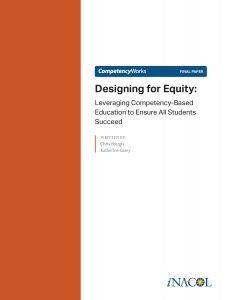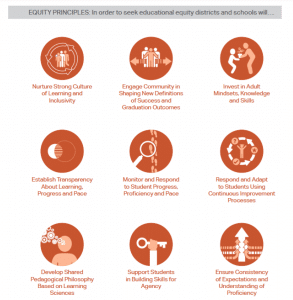CompetencyWorks Releases Equity Report for Ensuring All Students Succeed in Personalized, Competency-Based Education
Education Domain Blog
 The role of public education has never been more important – it is the bedrock of democracy. Competency-based education holds promise as a uniquely powerful model for fostering equity, but only if equity is an intentional design feature embedded in the culture, structure and pedagogy.
The role of public education has never been more important – it is the bedrock of democracy. Competency-based education holds promise as a uniquely powerful model for fostering equity, but only if equity is an intentional design feature embedded in the culture, structure and pedagogy.
Despite dramatic improvements in education over the last century, the one-size-fits-all, delivery-of-curriculum, time-based system simply does not work as well as needed. In fact, the traditional system was designed to rank and sort students through a combination of practices: curriculum based on age regardless of students’ previous experiences, grading policies that inflated or reduced grades based on behavior, educational pathways that set different expectations for students and passing students on to the next level with Cs and Ds at the end of each year despite the fact that they had not learned what they needed for more advanced courses.
With the idea that intelligence was immutable underpinning the traditional K-12 system, children were either labeled smart or not so smart, good students or not, and nothing could change that. Different expectations were set for students. Teachers played a powerful role in determining students’ futures based on whether or not they were deemed college material. Furthermore, if intelligence was unalterable, there was not much an educator could do to change the educational trajectory of students. Efficacy and accountability of the teaching profession and schools were diminished.
The students who have been most harmed by the traditional system are those born into families without a college education and/or that struggle to make ends meet, children of color, children with disabilities who require some type of accommodation and children who are new to our country or were raised in homes speaking a primary language other than English. We wrap these children together under the label “historically underserved.” The students who benefited the most were middle and upper income, white, and until the last twenty years, males.
Across the country, educators and policymakers are coming to the same conclusion: the structure of the traditional system is a barrier. The premise of competency education is that the culture, structure and pedagogy of the traditional education system, designed to sort students, can be replaced with one that is designed for every student to succeed.
Still, the question remains: How should we think about equity in a personalized, competency-based system to ensure that every student is indeed successful? CompetencyWorks released a new report, Designing for Equity: Leveraging Competency-Based Education to Ensure All Students Succeed, which offers equity strategies for personalized, competency-based education to ensure a more equitable K-12 education system. Districts and schools can use the equity principles within this report to develop an equity agenda within their personalized, competency-based systems.
This paper explores the potential pitfalls and strategies to ensure a more equitable education system. The driving questions include:
- How should equity be defined to be meaningful in a personalized, competency-based system?
- Why does the traditional education system need to change and how will competency-based systems offer more equitable learning environments?
- What principles or elements need to be in place to ensure that competency-based education fulfills its promise to offer a more equitable education system?
- How can we work together as a field to ensure that competency-based systems take full advantage of what we know about equity strategies to benefit all students, especially those who have been historically underserved?
Read more in the full report, or access the following related resources:
- CompetencyWorks: Quality and Equity by Design: Charting the Course for the Next Phase of Competency-Based Education
- National Equity Project: Definition of Educational Equity
- Stanford News: Local education inequities across U.S. revealed in new Stanford data set
- Students at the Center Hub: Motivation, Engagement, and Student Voice
- Center for Global Education: What Is Global Competence?
